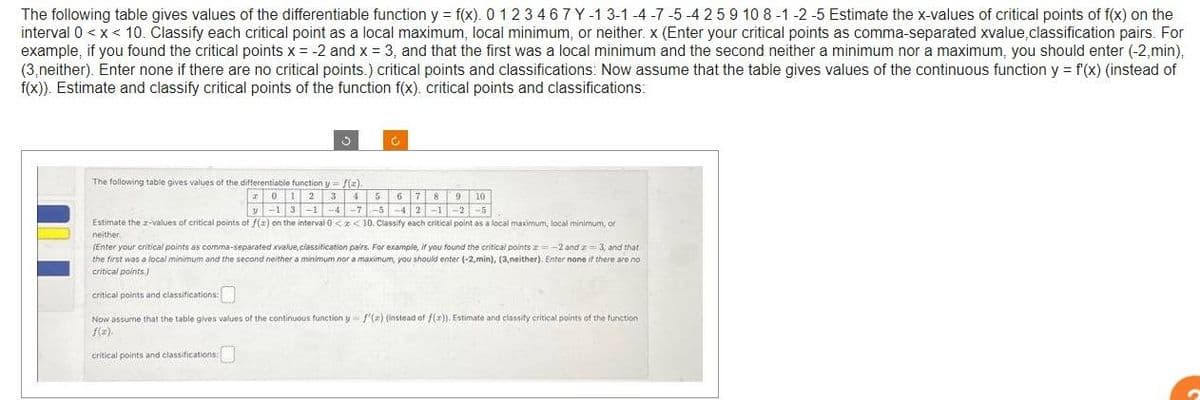The following table gives values of the differentiable function y = f(x). 0123467Y-13-1-4-7-5-4259 10 8-1-2-5 Estimate the x-values of critical points of f(x) on the interval 0 < x < 10. Classify each critical point as a local maximum, local minimum, or neither. x (Enter your critical points as comma-separated xvalue,classification pairs. For example, if you found the critical points x = -2 and x = 3, and that the first was a local minimum and the second neither a minimum nor a maximum, you should enter (-2,min), (3,neither). Enter none if there are no critical points.) critical points and classifications: Now assume that the table gives values of the continuous function y = f'(x) (instead of f(x)). Estimate and classify critical points of the function f(x). critical points and classifications: The following table gives values of the differentiable function y=f(2). 0 1 2 3 4 5 6 7 8 9 10 y-13-1-4-7-5-4 2-1-2-5 Estimate the z-values of critical points of f(x) on the interval 0
The following table gives values of the differentiable function y = f(x). 0123467Y-13-1-4-7-5-4259 10 8-1-2-5 Estimate the x-values of critical points of f(x) on the interval 0 < x < 10. Classify each critical point as a local maximum, local minimum, or neither. x (Enter your critical points as comma-separated xvalue,classification pairs. For example, if you found the critical points x = -2 and x = 3, and that the first was a local minimum and the second neither a minimum nor a maximum, you should enter (-2,min), (3,neither). Enter none if there are no critical points.) critical points and classifications: Now assume that the table gives values of the continuous function y = f'(x) (instead of f(x)). Estimate and classify critical points of the function f(x). critical points and classifications: The following table gives values of the differentiable function y=f(2). 0 1 2 3 4 5 6 7 8 9 10 y-13-1-4-7-5-4 2-1-2-5 Estimate the z-values of critical points of f(x) on the interval 0
College Algebra (MindTap Course List)
12th Edition
ISBN:9781305652231
Author:R. David Gustafson, Jeff Hughes
Publisher:R. David Gustafson, Jeff Hughes
Chapter3: Functions
Section3.3: More On Functions; Piecewise-defined Functions
Problem 99E: Determine if the statemment is true or false. If the statement is false, then correct it and make it...
Related questions
Question

Transcribed Image Text:The following table gives values of the differentiable function y = f(x). 0123467Y-1 3-1-4-7-5-4 2 5 9 10 8-1-2-5 Estimate the x-values of critical points of f(x) on the
interval 0 < x < 10. Classify each critical point as a local maximum, local minimum, or neither. x (Enter your critical points as comma-separated xvalue,classification pairs. For
example, if you found the critical points x = -2 and x = 3, and that the first was a local minimum and the second neither a minimum nor a maximum, you should enter (-2,min),
(3,neither). Enter none if there are no critical points.) critical points and classifications: Now assume that the table gives values of the continuous function y = f'(x) (instead of
f(x)). Estimate and classify critical points of the function f(x). critical points and classifications:
The following table gives values of the differentiable function y=f(z).
2012
3 4 5 6 7 8 9 10
13-1-4-7-5-4212-5
Estimate the x-values of critical points of f(x) on the interval 0<x< 10. Classify each critical point as a local maximum, local minimum, or
neither.
(Enter your critical points as comma-separated xvalue, classification pairs. For example, if you found the critical points=-2 and 2-3, and that
the first was a local minimum and the second neither a minimum nor a maximum, you should enter (-2,min), (3, neither). Enter none if there are no
critical points.
critical points and classifications:
Now assume that the table gives values of the continuous function y f'(z) (instead of f(x)). Estimate and classify critical points of the function
f(x).
critical points and classifications:
Expert Solution
This question has been solved!
Explore an expertly crafted, step-by-step solution for a thorough understanding of key concepts.
This is a popular solution!
Trending now
This is a popular solution!
Step by step
Solved in 3 steps with 2 images

Recommended textbooks for you

College Algebra (MindTap Course List)
Algebra
ISBN:
9781305652231
Author:
R. David Gustafson, Jeff Hughes
Publisher:
Cengage Learning

College Algebra (MindTap Course List)
Algebra
ISBN:
9781305652231
Author:
R. David Gustafson, Jeff Hughes
Publisher:
Cengage Learning